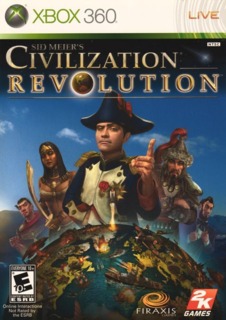When I first played the game it was good, but when I started to replay it, It blew off my balls
User Rating: 6.5 | Sid Meier's Civilization Revolution PS3
The main game of Civilization Revolution begins in 4000 BC, with a lone settler in the middle of a little-explored region. That settler has the capability to found a city, which, depending on its specific mix of geographical surroundings, begins harvesting food (for the continued growth of the city), production (for the creation of units and buildings), and trade (that can be then turned into either research points or wealth). Over time, further settlers can be created, forming new cities; buildings can be built to improve each city's overall productivity; military units can be formed, focusing either on defense, offense, or exploration; technologies can be researched, allowing for newer buildings and units; etc. Buildings in a final category, "Wonders," can only be built in one city per game, and provide major advantages to the civilization that builds it, either across their entire empire or just in the building city, depending on the Wonder. Meanwhile, rival civilizations are encountered, which can be both valuable trade partners, strategic allies, or dangerous enemies. Ultimately, each civilization competes for land and resources with the purpose of eventual military, technological, cultural, or economic domination.
Civilization Revolution is a turn based strategy game, with every "turn" representing the passage of several years within the game, which changes from 100 years in the beginning to two years by the end, reflecting the faster pace of contemporary society made possible by technological advancements. Later-era units and buildings are also more "expensive" to build (in terms of production points) than earlier ones, which is matched with cities' increased efficiency and population. Where the early game tends to be focused on exploring and expanding one's empire, the later game is dominated by the interactions forced upon the player by rival civilizations.

